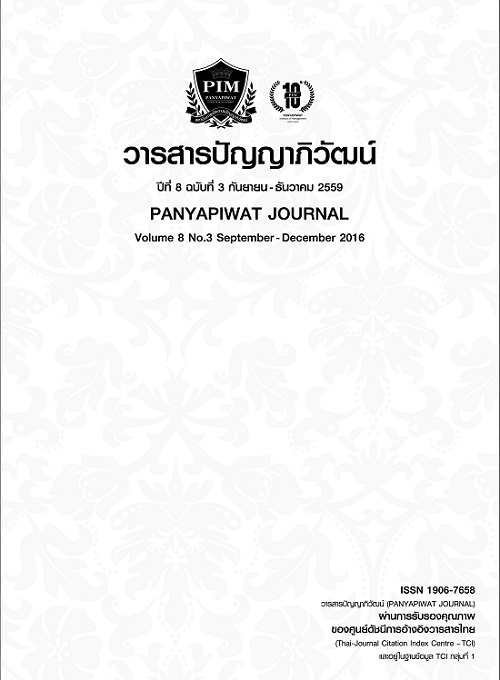การใช้เกมกระดานเพื่อสร้างความตระหนักรู้ต่อการเตรียมความพร้อมรับมือภัยพิบัติทางธรรมชาติ
Main Article Content
บทคัดย่อ
การใช้เกมกระดานเพื่อเตรียมความพร้อมรับมือภัยพิบัติทางธรรมชาติมีการดำเนินการมาอย่างต่อเนื่องตลอดหลายสิบปีที่ผ่านมา ตั้งแต่เกมกระดานที่ชื่อ Disaster ที่ถูกพัฒนาขึ้นในปี ค.ศ. 1979 จนถึงเกมกระดานที่ชื่อ Hazagora ที่ถูกพัฒนาขึ้นในปี ค.ศ. 2015 เนื่องจากการใช้เกมกระดานเพื่อสร้างความตระหนักรู้ต่อการเตรียมความพร้อมรับมือภัยพิบัติทางธรรมชาติ ช่วยสนับสนุนการแลกเปลี่ยนเรียนรู้เกี่ยวกับเรื่องภัยพิบัติทางธรรมชาติระหว่างผู้เล่นด้วยกัน และนำไปสู่การสร้างความสามัคคีและการร่วมแรงร่วมใจกันในชุมชนและสังคมได้ดียิ่งขึ้น ด้วยเหตุนี้การนำเกมกระดานมาใช้เพื่อพัฒนาความรู้และสร้างความตระหนักต่อการเตรียมความพร้อมรับมือภัยพิบัติทางธรรมชาติจึงเป็นเครื่องมือที่มีประสิทธิภาพที่ควรนำมาใช้ควบคู่ไปกับเครื่องมือหรือกิจกรรมอื่นที่เกี่ยวข้องกับภัยพิบัติได้ บทความนี้มีวัตถุประสงค์เพื่อศึกษาความเป็นมาของเกมกระดานและการประยุกต์เกมกระดานเพื่อการสร้างความตระหนักรู้ต่อการเตรียมความพร้อมรับมือภัยพิบัติทางธรรมชาติ
The use of board games for encouraging natural disaster preparedness has long been implemented for past decades begun with the serious board game called “Disaster” which was developed in 1979 to the latest version of disaster board game “Hazagora” developed by Belgian researchers in 2015. Using board games to develop natural disaster preparedness awareness can help support knowledge sharing about natural disaster among game players leading to better cohesiveness and collaboration among people in communities and societies. Thus, using board games for developing knowledge and natural disaster preparedness awareness deems to be an effective tool that can be utilized along with other disaster preparedness tools and activities. This paper aims to study the history of board games and the implementation of board games for building natural disaster preparedness awareness.
Article Details
“ข้าพเจ้าและผู้เขียนร่วม (ถ้ามี) ขอรับรองว่า บทความที่เสนอมานี้ยังไม่เคยได้รับการตีพิมพ์และไม่ได้อยู่ระหว่างกระบวนการพิจารณาลงตีพิมพ์ในวารสารหรือแหล่งเผยแพร่อื่นใด ข้าพเจ้าและผู้เขียนร่วมยอมรับหลักเกณฑ์การพิจารณาต้นฉบับ ทั้งยินยอมให้กองบรรณาธิการมีสิทธิ์พิจารณาและตรวจแก้ต้นฉบับได้ตามที่เห็นสมควร พร้อมนี้ขอมอบลิขสิทธิ์บทความที่ได้รับการตีพิมพ์ให้แก่สถาบันการจัดการปัญญาภิวัฒน์หากมีการฟ้องร้องเรื่องการละเมิดลิขสิทธิ์เกี่ยวกับภาพ กราฟ ข้อความส่วนใดส่วนหนึ่งและ/หรือข้อคิดเห็นที่ปรากฏในบทความข้าพเจ้าและผู้เขียนร่วมยินยอมรับผิดชอบแต่เพียงฝ่ายเดียว”
เอกสารอ้างอิง
Carr, K. (2015). Who invented board games? – History of board games. Retrieved December 28, 2015, from http://quart.us/games/board.htm
Clerveaux, V., Spence, B. & Katada, T. (2008). Using game technique as a strategy in promoting disaster awareness in Caribbean multicultural societies: The disaster awareness game. Journal of Disaster Research, 3(5), 1-13.
Clerveaux, V., Spence, B. & Katada, T. (2010). Promoting disaster awareness in multicultural societies: The DAG approach. Disaster Prevention and Management, 19(2), 199-218.
Hawkinson, E. (2013). Board game design and implementation for specific language learning goals. Retrieved December 28, 2015, from http://www.academia.edu/7295897/Board_Game_Design_and_Implementation_for_Specific_Learning_Goals
International Decade for Natural Disaster Reduction. (1995). Learning about natural disaster – games and projects for you and your friends. Retrieved November 23, 2015, from http://www.mona.uwi.edu/cardin/virtual_library/docs/1248/1248.pdf
International Federation of Red Cross and Red Crescent Societies. (2000). Increasing community disaster awareness: Disaster preparedness training programme. Retrieved November 23, 2015, from http://www.ifrc.org/Globl/Inccdp.pdf
International Finance Corporation. (2011). Disaster and emergency preparedness: Activity guide for K to 6th grade teachers. Retrieved November 23, 2015, from http://www.riskred.org/schools/ifc1.pdf
Khamprathom, T. (2015). ‘Board game’ Growing trendy business. Retrieved December 15, 2015, from http://www.komchadluek.net/detail/20150414/204681.html
Mackay, R. F. (2013). Playing to learn: Panelists at Stanford discussion say using games as an educational tool provides opportunities for deeper learning. Retrieved November 23, 2015, from http://news.stanford.edu/news/2013/march/games-education-tool-030113.html
Mossoux, S., Delcamp, A., Poppe, S., Michellier, C., Canters, F. & Kervyn, M. (2015). HAZAGORA: will you survive the next disaster? – a serious game to raise awareness about geohazards and disaster risk reduction. Natural Hazard and Earth System Sciences, 3, 5209-5245.
Parker Brothers. (1979). Disaster. [Board Game]. Salem: MA.
Promsri, C. (2014). Natural disaster preparedness awareness: Literature review. Executive Journal, 34(2), 92-115.
Pulsipher, L. (2006). The essence of Euro-style games. Retrieved December 15, 2015, from http://www.thegamesjournal.com/articles/Essence.shtml
Pulsipher, L. (2006). The essence of Euro-style games. Retrieved December 15, 2015, from http://www.thegamesjournal.com/articles/Essence.shtml
Silverman, D. (2013). How to learn board game design and development. Retrieved December, 18, 2015, from http://gamedevelopment.tutsplus.com/articles/how-to-learn-board-game-design-and-development--gamedev-11607
Spence, B. (2012). Engagement of schools: long-term strategy for enhancing disaster resilience capacity-building in CDEMA- participating states. Retrieved December 28, 2015, from http://www.cdema.org/cdmconference/presentations/2012/session_2b/Balfour_Spence.pdf
UN/ISDR & UNICEF. (2004). Learning from today’s disasters for tomorrow’s hazards:2004 World Disaster Reduction Campaign. Retrieved December 28, 2015, from http://www.unisdr.org/2004/campaign/pa-camp04-riskland-eng.htm
UNESCO Asia. (2007). Disaster master: natural disaster preparedness game. Retrieved December 28, 2015, from http://www.preventionweb.net/educational/view/4420
Wiebenga, S. R. (2005). Guidelines for selecting, using, and evaluating games in corporate training. Performance Improvement Quarterly, 18(4), 19-36.
Wikipedia. (2015). Board game. Retrieved December 25, 2015, from https://en.wikipedia.org/wiki/Board_game


